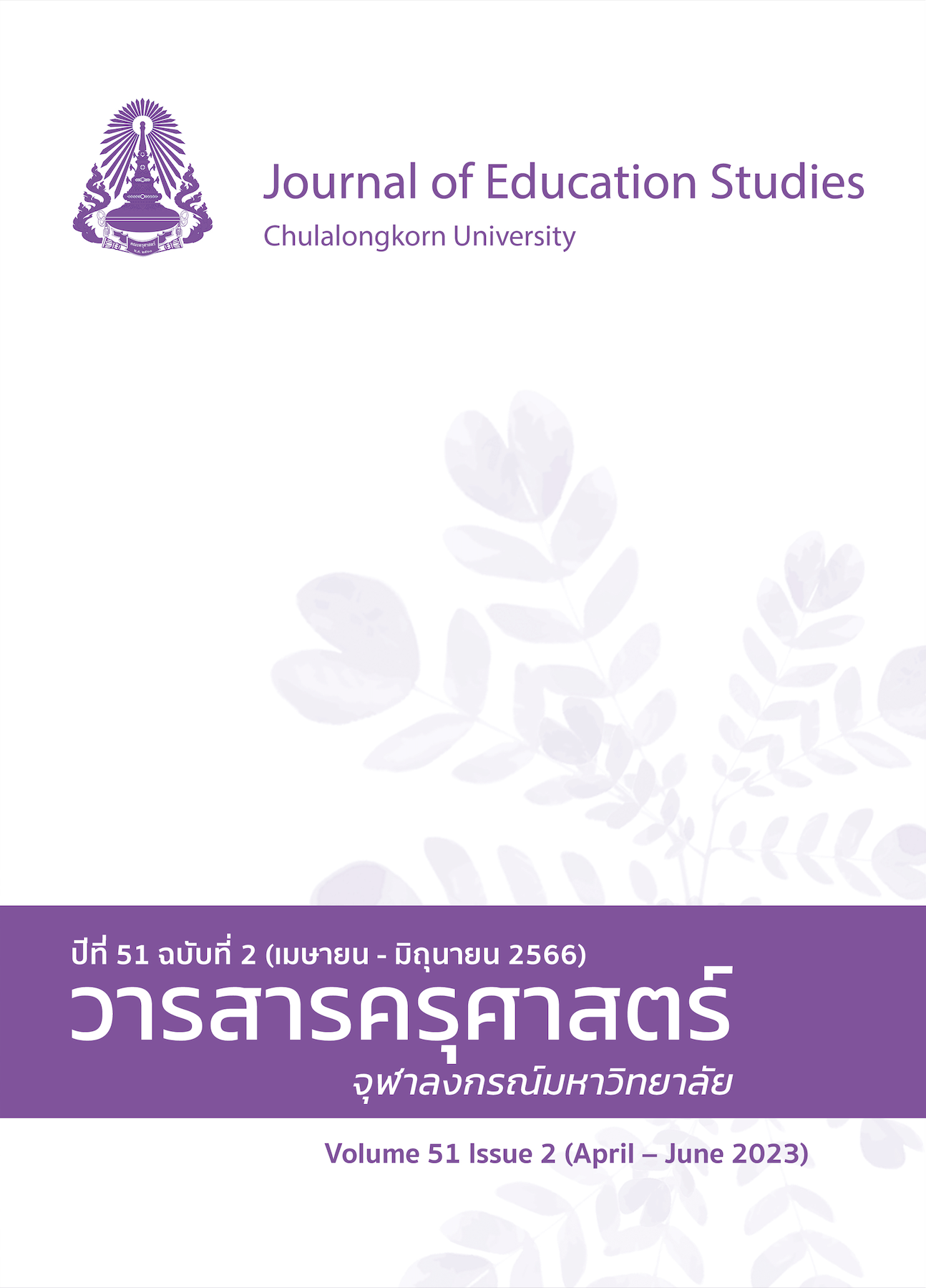A Comparison of Digital Competency Needs in Normal and Crisis Situations of School Administrators and Physical Education Teachers
DOI:
https://doi.org/10.14456/educu.2023.14Keywords:
digital competence, physical education teachers, needs assessment, crisis situationAbstract
The purpose of this research was to compare the digital competence needs of school administrators and physical education teachers in normal and crisis situations. A questionnaire with 25 needs assessment questions was designed, and a data collection tool was used to collect 165 samples.
Data analysis included sum, percentage, mean, standard deviation, t-test, and one-way ANOVA using Scheffe’s method. The results revealed that the need for digital competencies for school administrators and physical education teachers was high in all aspects. When comparing digital competency requirements in normal and crisis situations, there were no significant differences at the 0.05 level. When considering
the comparison by age, position, and work experience variables, it was found that during normal situations, there was a significant difference in terms of position and work experience variables. On the other hand,
in crisis circumstances, there was a statistically significant difference at the 0.05 level based on age, position, and work experience variables. The research findings can be used to design and develop a digital competence model, policy, and training programs in the form of upskilling and reskilling programs for administrators and physical education teachers in secondary schools so that they can make their operations more efficient and effective.
References
ภาษาไทย
กระทรวงการท่องเที่ยวและกีฬา. (2564). (ร่าง) แผนพัฒนาการกีฬาแห่งชาติ ฉบับที่ 7 (พ.ศ.2565-2570). https://anyflip.com/iujzr/bvol/basic/101-150
ณรงค์ โพธิ์พฤกษานันท์ และ ปุริปุญญวิทย์ ธนนาถเชาวรินทร์. (2562). รายงานการวิจัย เรื่องการศึกษาความต้องการฝึก อบรมระยะสั้น. https://repository.rmutp.ac.th/bitstream/handle/123456789/3438/LARTS_63_05. pdf?sequence=1&isAllowed=y
ทรงสิริ วิชิรานนท์ และ อรุณี อรุณเรือง. (2559). รายงานวิจัย เรื่อง การประเมินความต้องการจำเป็นในการจัดสภาพแวดล้อมที่เอื้อต่อการพัฒนาการเรียนรู้ของนักศึกษา มหาวิทยาลัยเทคโนโลยีราชมงคลพระนคร. https://repository. rmutp.ac.th/bitstream/handle/123456789/2208/LARTS_60_05.pdf? sequence=1&isAllowed=y
บุศรินทร์ ใจวังโลก, สุขแก้ว คำสอน และ เกรียงศักดิ์ สุวรรณวัจน์. (2561). การศึกษาความต้องการจำเป็นในการพัฒนาความสามารถด้านการจัดการเรียนรู้ ของครูสังกัดสำนักงานเขตพื้นที่การศึกษาประถมศึกษาพิษณุโลก เขต 3. วารสารมนุษยศาสตร์และสังคมศาสตร์ บัณฑิตวิทยาลัย มหาวิทยาลัยราชภัฏพิบูลสงคราม, 12(2), 470-485.
พิชญาภา ที่พึ่ง. (2555). การศึกษาความต้องการจำเป็นในการพัฒนาด้านการจัดการเรียนการสอนของคณะวิทยาศาสตร์และเทคโนโลยี มหาวิทยาลัยเทคโนโลยีราชมงคลพระนคร ตามทัศนะของนักศึกษาและอาจารย์. วารสารวิชาการและวิจัย มทร.พระนคร, 7(1), 48-56.
มยุรี เสือคำราม. (2563). การพัฒนาการจัดการเรียนการสอนแบบผสมผสานของมหาวิทยาลัยสร้างสรรค์ในช่วงวิกฤติการณ์
น้ำท่วมและช่วงเหตุการณ์ปกติ. วารสารวิชาการ มหาวิทยาลัยหอการค้าไทย มนุษยศาสตร์และสังคมศาสตร์, 40(3), 14-24.
วัชรวลี ตั้งคุปตานนท์ และ วาสนา สีลาภเกื้อ. (2555). สมรรถนะด้านเทคโนโลยีสารสนเทศและการสื่อสารที่จำเป็นของบุคลากรสายสนับสนุนของมหาวิทยาลัยสงขลานครินทร์. [วิทยานิพนธ์ปริญญามหาบัณฑิต, มหาวิทยาลัยสงขลา-นครินทร์. https://kb.psu.ac.th/psukb/handle/2010/8811
วาสนา คุณาอภิสิทธิ์. (2547). การพัฒนารูปแบบการพัฒนาครูในการจัดทําสาระหลักสูตรกลุ่มสาระการเรียนรู้สุขศึกษาและพลศึกษา. [วิทยานิพนธ์ปริญญาดุษฏีบัณฑิต, จุฬาลงกรณ์มหาวิทยาลัย]. Chulalongkorn University Intellectual Repository (CUIR). https://cuir.car.chula.ac.th/ handle/123456789/534
สำนักงานเขตพื้นที่การศึกษามัธยมศึกษากาญจนบุรี. (2564). ผู้บริหารสถานศึกษา. http://www.sesaok.go.th/index. php/about/2021-03-08-08-45-38
สำนักงานเขตพื้นที่การศึกษามัธยมศึกษานครปฐม. (2565). ข้อมูลในสังกัด สพม.นครปฐม. https://www. mathayom-npt.go.th/
สำนักงานข้าราชการพลเรือน (ก.พ.) (2560). แนวทางพัฒนาทักษะด้านดิจิทัลของข้าราชการและบุคลากรภาครัฐ เพื่อการปรับเปลี่ยนเป็นรัฐบาลดิจิทัล (มติคณะรัฐมนตรี วันที่ 26 กันยายน 2560). https://www.ocsc.go.th/sites/ default/files/attachment/page/process_dev_digital.pdf
สำนักงานคณะกรรมการดิจิทัลเพื่อเศรษฐกิจและสังคมแห่งชาติ (สดช.) กระทรวงดิจิทัลเพื่อเศรษฐกิจและสังคม. (2563). กรอบสมรรถนะด้านดิจิทัลสำหรับพลเมืองไทย. https://web.parliament.go.th/assets/portals/1/files/ digital_competence_framework_for_thai_citizens.pdf
อมรรัตน์ สิทธิศักดิ์. (2563). สมรรถนะการรู้ดิจิทัลที่จำเป็นสำหรับการปฏิบัติงานของบุคลากร คณะมนุษยศาสตร์และสังคมศาสตร์ มหาวิทยาลัยขอนแก่น. วารสารสารสนเทศศาสตร์, 38(4), 61-81.https://doi.org/ 10.14456/ jiskku.2020.22
อัญชลี สารรัตนะ. (2554). การประเมินความต้องการที่จำเป็นเพื่อการพัฒนาหลักสูตรและการเรียนการสอน. วารสารศึกษา- ศาสตร์ มหาวิทยาลัยขอนแก่น, 34(1-2), 9-20.
ภาษาอังกฤษ
European Commission. (2008). Digital literary review. https://www.ifap.ru/library/book386.pdf
Glister, P. (1997). Digital literacy. John Wiley & Sons Inc.
National Institute of Education (NIE). (2009). A teacher education model for the 21st century. https:// www. nie.edu.sg/docs/default-source/te21_docs/te21_executive-summary_14052010---updated.pdf?sfvr sn=2
Spante, M., Hashemi, S.S., Lundin, M., & Algers, A. (2018). Digital competence and digital literacy in higher education research: Systematic review of concept use. Cogent Education, 5(1), 1519143. https:// www.tandfonline.com/doi/full/ 10.1080/2331186X.2018.1519143
Downloads
Published
How to Cite
Issue
Section
License

This work is licensed under a Creative Commons Attribution-NonCommercial-NoDerivatives 4.0 International License.




